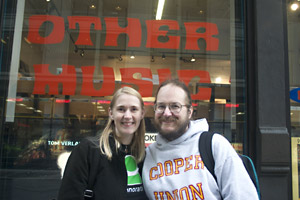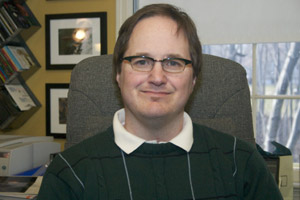A meditation on the nature of social media online
In the wake of my jaunt into the city last week, I've been thinking about the nagging disenchantment I've been feeling toward blogs and Blogistan in the past year or so. I think a lot of it has root in something I figured out well before that, that the web in general and blogs in particular just don't afford social connection to the degree that some other social media, to use the current buzzword, on the Internet do. I've been online to one degree or another for almost 20 years at this point, and given a lot of thought to the formation of communities and relationships online. So maybe I can look at some of these other media and what their characteristics are to try and figure out why blogs and the web are in some way unsatisfying.
IRC is perhaps the most engaging form of social media on the Internet. It happens synchronously, in real time, with little delay between projection and response. In this way, it closely resembles real life conversation. The architecture of IRC is such that several servers around the world are knit into a seamless whole so that any given channel appears to be a single location. There are many networks, so there's a certain degree of Balkanization, but by and large, if you're interested in a particular topic, there's one place to go to discuss it, and once you've found that place, you can become part of the conversation. So if you want to discuss shortwave radio with like minded individuals in real time, there's one place you can go; if you want to discuss the lovely and talented Suw Charman, there's another place you can go, and all of the people who are also interested at any given moment in discussing these topics will also be there. It's a many-to-many experience. The closest real life analog would be a party. (As an aside, IRC can be dangerously addictive; I tend to look at it these days the way a recovering alcoholic looks at a bottle of scotch. It's almost too engaging.) The content of the channels tends to be brief interchanges. The tools do not lend themselves to lengthy writings. I'm not sure if it's just the client software I've used or a limitation of the server software, but messages longer than a certain rather short number of characters get truncated. As such, the tools lend themselves to more conversational content, short back-and-forths among people. Individuals can log the conversations that take place in a given channel, but it's not done as a matter of course as an inherent part of the architecture; this probably won't go down on your permanent record. IRC is a good way to meet people online, and because of the way conversation unfolds in real time, it's a good way to become friends.
Instant Messaging is similar to IRC in that it's synchronous, but there's no central locations to discuss given topics. It tends to be one-to-one, or at most few-to-few, rather than many-to-many. And because of the lack of central locations, in my experience, it tends to rely on existing relationships rather and is a pretty poor way of creating new ones. (I could be wrong on this; I only use IM at work rather than for fun, but this is my experience.) Short items dominate here as in IRC. Like IRC, the likelihood is strong that there will be no permanent record of conversations. IM is engaging in a similar manner to IRC, and because of its similarity to real-life conversation, can quickly strengthen relationships. IM's closest real life analog would be intimate conversation, or perhaps phone calls.
Netnews (USENET) and mailing lists tend work similarly, so I'll discuss them together. Both work asynchronously. Conversation unfolds over time, rather than in real time. Newsgroups and mailing lists both tend to coalesce around given topics, although the conversation may often stray from the putative topic of the list/group. The sense of place is perhaps not as defined as with IRC, but still exists; there is a mailing list or group for your interest, and that's where the people who are interested in your topic of interest congregate. The delays in propagation of material detract from the sense of place by increasing the perceived distance between participants, although with high speed networks and protocols like NNTP and SMTP greasing the rails, this is less of a factor than it was 20 years ago. It's certainly possible to form relationships in newsgroups and mailing lists, but it may take a little longer than in IRC because the conversation unfolds over days and weeks rather than minutes. Individual messages here are longer in general than those in IRC or instant messaging; the atomic unit here is the message or post, rather than the sentence. They do tend to form threads, or conversations, however. Strange conversations where one person talks at length, then others do, but conversations nonetheless. The tracks we leave in these media are more-or-less permanent (although that came as something of a surprise to those of us on Usenet in the late 80s when Google unveiled our permanent records....) I'm not sure what the real-life analog for these are; they may be entirely or partially new beasts.
Then there's the web. Conversations on the web, such as they are, take place asynchronously. Further, there is generally no central place to gather; if you're interested in a topic, there may be dozens, hundreds, even thousands of places to go to find like-minded individuals. As such, the distance between people is tremendous compared to other, more intimate media with well-defined gathering places. There is a strong sense of place on the web, but it tends to be parochial rather than communal: this is my site, just as my house is my house. There are a few topic-specific destinations that draw large crowds; people interested in liberal activist politics can go to Daily Kos, and those interested in technology can spend their time at Slashdot. But even where such destinations exist, there are thousands or even millions of other sites out there that address the same topics, most in the low-traffic, high-volume part of Blogistan referred to as "the long tail". There's no guarantee that if you write something in your part of the long tail that it will become part of the conversation, that anyone will even notice. The atomic unit on the web is the page, or in the case of blogs, the post, both (hopefully) fully conceived to cover their intended subject and to do so without requiring (or in most cases when speaking of the web in general, allowing) interjection by others. Thanks to Google cache and archive.org, this will, in fact, go down on our permanent record. I think of the experience of millions of Balkanized web sites engaging in conversation as being roughly akin to thousands of people standing on widely-dispersed rocks in a huge field, wielding megaphones, trying desperately to talk to those standing on the nearest rocks, and only occasionally succeeding. A few people have P.A. systems.
Humans are social creatures. We want to connect with each other. So we've seen the rise of certain protocols like trackback and tagging, and tools like Technorati and PubSub, that try to connect the various strands of conversation. These don't always succeed; trackback has been rendered largely useless by spammers with their P.A. systems, and the recent furor over splogs indicates that Technorati and Google are seeing their usefulness in this effort diminished and possibly destroyed. It's testament to our nature as social creatures that we try to make this medium work for us in a social manner. But the underlying nature of the web fights us. There are other systems that work better. I tend to see the flocking of so many A-list bloggers to other social media like Joi Ito's IRC channel last year and the rush by so many to attend blogging conferences as a kind of implicit admission that the connections made via blogs and the web are not strong enough to satisfy our need for contact.
Posted at 6:27 PM
Link to this entry || 1 comment || Trackbacks (0)


![[ photo of Mischief, a black and white cat ]](/images/moosechief.jpeg)
![[ photo of Sylvester, a black and white cat ]](/images/conehead_sm.jpeg)
